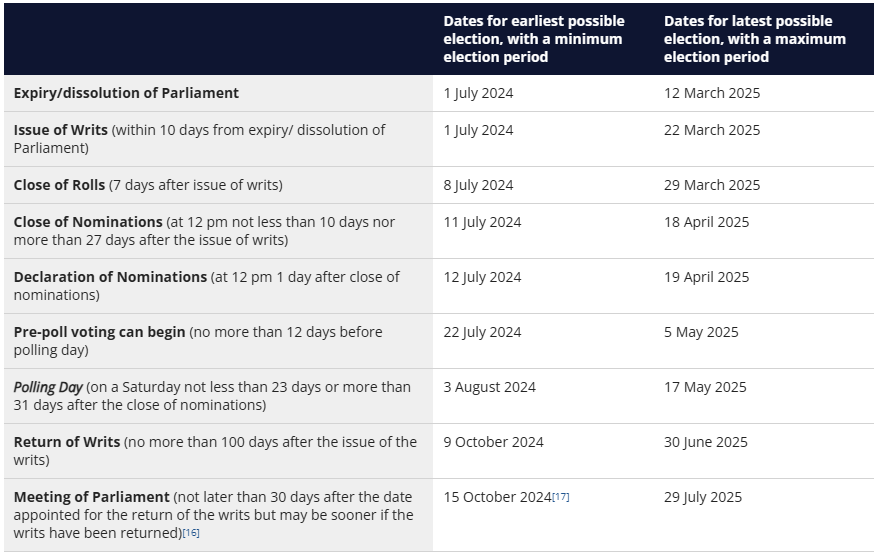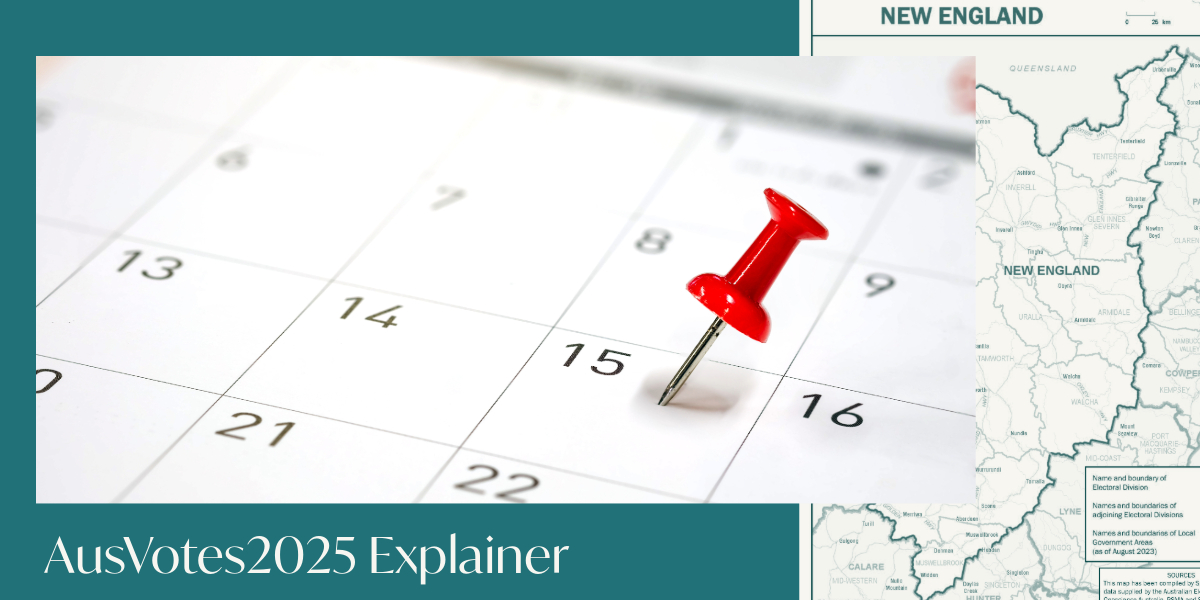The date of the next Australian federal election is still unconfirmed, and it is solely up to Prime Minister Anthony Albanese to decide when to call it. However, it has to be held by May 17, and political circles are pointing to April 12 as the most likely date.
What are the rules?
There are lots of rules around when an election can and must be held.
The Australian Constitution and the Commonwealth Electoral Act 1918 dictate the timing of elections. The House of Representatives has a maximum three-year term from its first sitting, meaning the current Parliament will expire on July 25, 2025. However, elections are usually called before the maximum term expires.
A House of Representatives election can actually be requested at any time up to the expiration of the House in September this year. But it’s usually the expiration of the Senate term, rather than the House, that dictates when elections are called. The Senate term expires on June 30, and the election of half the Senators must happen up to one year before that date. So the election must be held in time to return the writs by June 30, 2025.
What is a writ?
A writ is a legal command. In this context, a writ is an order issued by the Governor General that an election be conducted and upon which the result is recorded.
It is possible to hold separate House and Senate elections, but voters don’t like being made to vote twice (or the extra cost) and punish Governments accordingly, so it doesn’t happen in practice.
There are strict and complex timing rules, and the dates have to comply with all of them. For example:
- The election must be held on a Saturday.
- The polling day must be at least 23 days but no more than 31 days after nominations close.
- The entire election process, from the issuance of writs to the return of results, must take no longer than 100 days.
- The writs for the election must be issued within 10 days of the dissolution or expiration of the House.
The earliest and latest possible Election Calendar

So, for a joint House/Senate election, the writs must be returned by June 30, and the minimum timeframe for an election is 33 days, which means the election must be held no later than May 17.
Why is April 12 the most likely date?
April is packed with public holidays, including Easter and Anzac Day, making the latter half of the month less attractive. However, holding the election on April 5 would mean starting the campaign before the West Australian state election on March 5, creating logistical complications.
That leaves April 12 as the most talked-about option. This date avoids clashes with major public holidays, however, the timing is tight.
The Governor-General formally issues the writs on the advice of the Prime Minister, setting the election process in motion. Albanese would need to call the election immediately after the West Australian election, with writs issued no later than the following Monday—March 10, a public holiday in some states—to ensure the minimum campaign period.
Staffers in Albanese’s office are suggesting April 12 to almost anyone who asks… which could be a good indication, or it could be a deliberate ploy to get the Coalition to waste some advertising and announcements early in the calendar.
How does the budget factor into the decision?
At this stage, the government is also scheduled to hand down a federal budget on March 25. However, if the election is called for April 12, this budget will be postponed until after the election.
This move could allow the government to avoid scrutiny over any negative economic outlook, including potential deficits or unpopular spending measures… or detail how it is going to pay for new measures, such as the weekend’s $8.5 billion boost to Medicare.
By calling an early election, Albanese can potentially also prevent the opposition from using the budget as a campaign issue and instead focus on shaping the election narrative on his own terms. This strategy has been used in the past by governments seeking to avoid difficult economic discussions ahead of a vote.
Alternatively, of there is good news in the budget, then they will likely go for a May 17 election so they can use the budget as a springboard into the election and to trumpet their performance as good economic managers.
When can we go and vote?
It depends on when the election is called, but soon. While election day itself will be a Saturday, voters who are unable to attend on the day have a couple of alternatives:
- Pre-poll voting: This opens at least 12 days before election day and allows voters to cast their ballots early at designated pre-poll centres. This is a popular option for those who may be working, travelling, or otherwise unavailable on the official polling day. Changes to electoral laws made very recently include allowing anyone with a disability or their carers to pre-poll.
- Postal voting: Voters who cannot physically attend a polling place can apply for a postal vote. Ballot papers are sent to the voter’s address, and they must complete and return them before the deadline to ensure their vote is counted.
Ensuring all Australians have the opportunity to vote is a key priority of the Australian Electoral Commission (AEC), and measures are in place to facilitate voting for those in remote locations, overseas, or with accessibility needs. Many communities in New England and Parkes will have mobile voting booths attend smaller and more remote communities prior to election day so you can vote without having to travel.
If the election is on April 12, Pre-Poll voting should begin on March 31.
Read all our coverage of the 2025 Australian Federal Election here.

